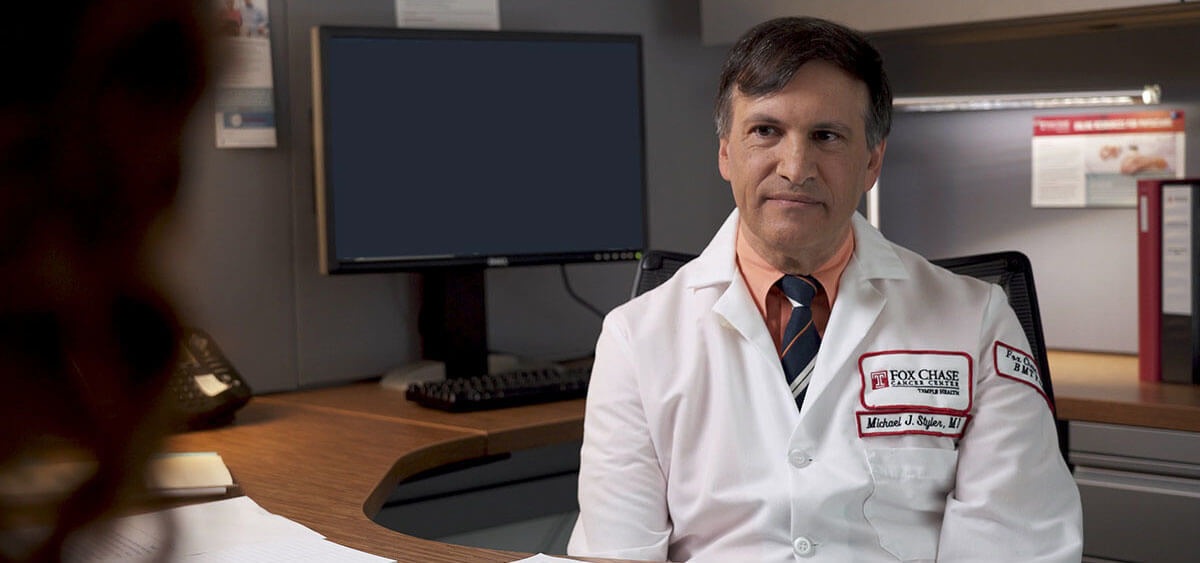Related Articles
00 / 00

A bone marrow transplant, also called a stem cell transplant, infuses healthy cells into the body to replace damaged or diseased bone marrow. Bone marrow is the soft, spongy center of the bone that contains the stem cells that produce white blood cells, red blood cells, and platelets, which all work to keep the body healthy.
Bone marrow transplants are frequently a key component of care for patients with hematologic malignancies, or cancers of the blood (including multiple myeloma, leukemia, and lymphoma). This procedure may be used in conjunction with chemotherapy alone or in combination with total body irradiation.
Typically, a bone marrow transplant may be needed if:
When people hear the term “transplant,” they may think of an operation, but a bone marrow transplant is not a surgical process. Stem cells are given back to the body in the same manner as a blood transfusion. The cells are pushed into IV tubing and travel back to the marrow to start making a new population of healthy blood cells.
Our team offers autologous and allogeneic transplantation, including matched unrelated donor and related haploidentical transplants. The type of transplant you receive is determined by several factors, including your diagnosis, the stage of your disease, your overall health, and your age:
Many blood cancer patients who respond well to initial therapy have shown even greater improvement when they receive a single course of very high-dose chemotherapy with an autologous transplant. This transplant method involves using the patient’s own previously collected healthy cells.
Conditions typically treated with autologous bone marrow transplant include multiple myeloma and lymphoma, particularly if the lymphoma is relapsed or refractory (meaning that the disease has either come back after initial treatment or didn’t respond fully to initial treatment). The course of high-dose chemotherapy overcomes the resistance of lingering cancer cells to treatment, and the autologous transplant acts as a rescue for the patient’s blood cells.
Multiple studies have shown that many patients stay in remission longer and have more durable response with this approach. The patient’s blood cell levels recover more quickly, and the process becomes much more tolerable for their system.
For allogeneic transplants, we make every effort to use donated cells that are as closely matched as we can identify. The best chance for finding a match is with a full sibling, where there is about a 25 percent chance of matching.
If a patient doesn’t have a family member who is a close match, there may be other options, including:
With haploidentical transplants, a family member may be able to donate cells for a transplant even if he or she is not a perfect match. In the past, mismatched cells often caused serious complications, but today, we can use a combination of chemotherapy and immunotherapy treatments after the transplant to suppress those cells and try to avoid negative reactions.
Some patients may not be able to receive blood or blood products from any person other than themselves. This may be true for religious reasons, safety, or any other personal decision.
As a result, interest has grown in minimizing blood transfusions and in performing bone marrow transplants without blood or blood products. The Fox Chase-Temple University Health Bone Marrow Transplant Program is a referral center for bloodless transplants, which don’t involve blood or blood products from other donors.
At Fox Chase, with careful support, we minimize the amount of blood that we take during the course of autologous transplants, by safely doing blood tests less often and by using much smaller tubes that take less blood for testing.
The red blood cells that our bodies make typically last for months, so most of the cells that patients come into the transplant with are still viable. In addition, the body makes new red blood cells every day, so there is a slow decrease in the blood count. As a result, the outcomes are very similar to those of patients who receive blood products.
You can request an appointment online or call 215-214-3122. For general information or to ask us a question, please visit our Contact Us page.



